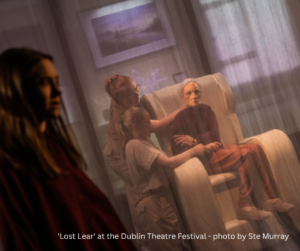Playwright Dan Colley based his latest piece at the Dublin Theatre Festival around the SPECAL method, in what the Irish Examiner’s theatre review called ‘inventive, touching and technically accomplished production, ‘Lost Lear’.
In ‘Lost Lear’, Joy – prompted by her main nursing-home carer and advocate Liam – imperiously and repeatedly rehearses various scenes from the play, confident in her abilities and her knowledge. Her troubled relationship with her son Conor takes centre stage too, as he struggles to come to terms with his mother’s condition and the (to him!) distinctly unusual day-to-day activities undertaken in the name of keeping her self-esteem to the fore.
Liam encourages Conor to understand and be a part of the rehearsal process to facilitate interaction with Joy, although the route is a painful one for a son who did not even know his mother until his teenage years and even then, was treated with rejection and indifference.
In all, a fascinating, absorbing tale that made me wince, smile and weep in turn.

Photography by Ste Murray from the play ‘Lost Lear’ by Dan Colley at the Dublin Theatre Festival 2022



